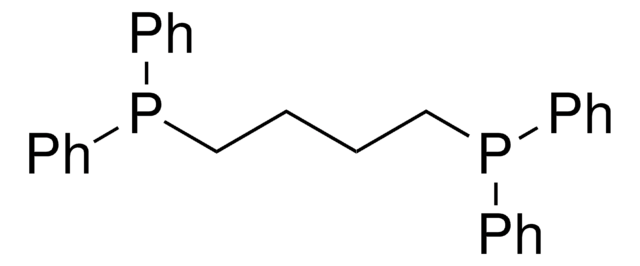8.22196
Chromium(0) hexacarbonyl
for synthesis
Synonym(s):
Chromium(0) hexacarbonyl, Chromiumcarbonyl
About This Item
Recommended Products
vapor pressure
0.35 hPa ( 20 °C)
Quality Level
form
crystals
mp
149-150 °C
density
1.77 g/cm3 at 20 °C
storage temp.
2-30°C
SMILES string
[Cr].[O+]#[C-].[O+]#[C-].[O+]#[C-].[O+]#[C-].[O+]#[C-].[O+]#[C-]
InChI
1S/6CO.Cr/c6*1-2;
InChI key
KOTQLLUQLXWWDK-UHFFFAOYSA-N
Application
- Stable Salts of Chromium Hexacarbonyl Cation: Research on the stability and properties of chromium hexacarbonyl cation expands the understanding of its role in coordination chemistry, potentially influencing applications in catalysis and materials science (Himmel, Breher, Krossing).
- Synthesis and Biological Evaluation: The use of chromium hexacarbonyl in the synthesis of organometallic complexes with biological activity, such as anticancer properties, suggests its utility in medicinal chemistry (Ha et al., 2023).
- Catalysis for Fuel Cells: Employed in the synthesis of efficient nanowire cathode catalysts for proton exchange membrane fuel cells, demonstrating its application in green energy technologies (Liu et al., 2020).
- Functionalization of 2D Materials: Used for the photochemical functionalization of gray arsenic, enabling applications in electronic and photonic devices, relevant for material science research (Sturala et al., 2019).
- Dissociative Electron Attachment Studies: Investigated for its interactions with low-energy electrons, relevant in fields like focused electron beam induced deposition (FEBID), impacting nanofabrication technologies (Kopyra et al., 2017).
Analysis Note
Identity (IR): passes test
Signal Word
Danger
Hazard Statements
Precautionary Statements
Hazard Classifications
Acute Tox. 3 Oral
Storage Class Code
6.1C - Combustible, acute toxic Cat.3 / toxic compounds or compounds which causing chronic effects
WGK
WGK 3
Flash Point(F)
Not applicable
Flash Point(C)
Not applicable
Certificates of Analysis (COA)
Search for Certificates of Analysis (COA) by entering the products Lot/Batch Number. Lot and Batch Numbers can be found on a product’s label following the words ‘Lot’ or ‘Batch’.
Already Own This Product?
Find documentation for the products that you have recently purchased in the Document Library.
Our team of scientists has experience in all areas of research including Life Science, Material Science, Chemical Synthesis, Chromatography, Analytical and many others.
Contact Technical Service









